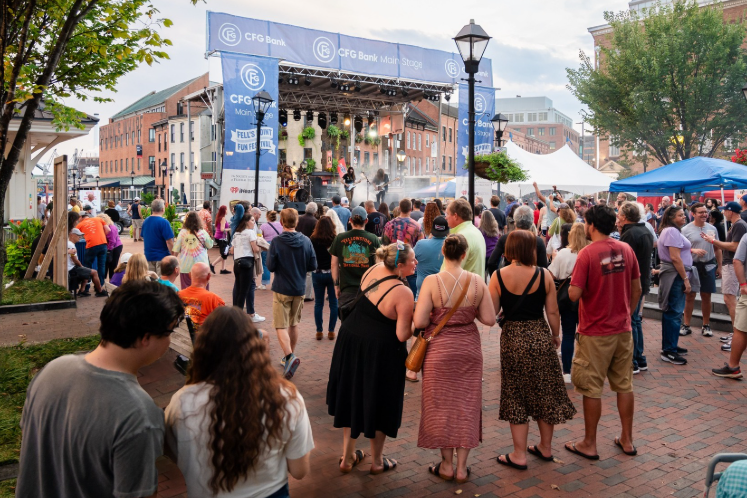Ambleside’s Festival of the Fells provides much more than just picturesque scenery; it is a striking illustration of how neighborhood-based outdoor activities can be incredibly successful in tearing down the unseen barriers that frequently prevent people from enjoying nature. Every year, in the untamed splendor of Cumbria’s Lake District, the festival combines athleticism and artistic expression through four days of guided hikes, wild swimming, creative workshops, and family-friendly activities. Although more experienced outdoor enthusiasts are drawn to trail running and abseiling, inclusive design has significantly increased these landscapes’ accessibility for people with mobility or sensory issues.

The event celebrates a tradition of shared stewardship by marking the 100th anniversary of the public gifting of 12 iconic peaks, including Great Gable, to the National Trust. However, the festival shifts its focus forward rather than backward. It focuses on how everyone can use Cumbria’s breathtaking landscape as a canvas, including professional writers, first-time swimmers, elderly people dealing with dementia, and children with disabilities. It’s a subtle but impactful message: you too belong here.
Festival of the Fells – Key Information
| Aspect | Details |
|---|---|
| Location | Ambleside, Lake District National Park, Cumbria |
| Frequency | Annual, four-day event in September |
| Activities | Guided walks, wild swims, abseiling, writing workshops, comedy, biking |
| Accessibility Focus | Events for people with mobility/sensory needs, access information |
| Partners | Accessible Cumbria Partnership, Lake District Estates |
| Historical Connection | 100 years since 12 fells were gifted to the National Trust |
| Cultural Highlights | Writing festival with workshops, keynote by Jen Ellis |
| Booking | Advance booking required for select sessions |
| Website |
A variety of activities are thoughtfully planned throughout the festival to suit varying degrees of comfort. For instance, Swim the Lakes’ wild swimming taster sessions are especially helpful for novices. These events, which take place on Friday and Saturday mornings, offer safety instructions and wetsuits to allay fears related to submersion in cold water. A small group is invited to glide under the stars in near silence on Friday nights at the Secret Britain Night Swim, an immersive experience that will live in the memory of anyone who is lucky enough to attend.
An increasing number of national festivals have adopted this inclusivity-first strategy in recent years. Events such as the Midlands’ Timber Festival and Kendal Mountain Festival are starting to include sensory-friendly programming, quiet areas, and thorough access guides. But what makes Festival of the Fells unique is how naturally its accessibility philosophy permeates every aspect, from the facilitators’ serene, inviting demeanor to the descriptions of the terrain on event pages.
Parallel to the main festival activities, there is a writing festival segment held on the historic John Hay Estate in Newbury, New Hampshire, which is equally enriching. Although it may come as a surprise, this cross-atlantic inclusion emphasizes the festival’s extraordinarily adaptable identity. Poetry and prose are covered in the workshops, and keynote speaker Jen Ellis, who created the viral inauguration mittens for Bernie Sanders, offers a grassroots perspective. The “Paths to Publishing” panel discussion is especially creative in its content, providing helpful advice for aspiring authors in a nurturing setting.
Given the depth of programming, ticket prices are still surprisingly low. The full-day writing workshop costs £175 (member discounts apply), and it includes expert-led sessions, a keynote address, and meals in a tranquil natural setting. This draws attention from authors and publishing insiders who understand the unique value of fusing outdoor experience with intellectual exchange, in addition to creatives from all over the UK.
The festival’s strong ties to Ambleside itself are among its most endearing features. Local companies get involved with gusto—cafés read poetry, bike shops rent bikes at discounted prices, and artists erect impromptu displays in quiet areas of town. In addition to strengthening the local economy, these initiatives help to create a community that feels remarkably close-knit for a destination that welcomes millions of visitors annually.
Although they may not always be present in person, celebrities with connections to the Lake District—like TV naturalist Chris Packham or Dame Judi Dench, a well-known supporter of rural preservation—are frequently mentioned in discussions and workshops for their impact. A local guide mentioned in a previous conversation how Packham’s documentaries had raised awareness of nature tourism, which in turn had boosted attendance at inclusive events like these. Even though these comments are anecdotal, they represent a broader cultural trend: nature is now a shared need rather than a niche interest.
In order to satisfy the growing demand for inclusive programming, the festival has also been greatly expanded through strategic partnerships and community-driven planning. The continuous support of the Accessible Cumbria Partnership guarantees the availability of comprehensive route maps, rest areas, and assistance volunteers during the major events. Despite being subtly integrated, this infrastructure effectively creates a secure and inviting environment.
On a societal level, the event reflects a broader change in the perception of outdoor areas—not just as obstacles to be overcome, but as communal resources that foster creativity, community cohesion, and mental well-being. The Festival of the Fells’ philosophy and the NHS’s investigation of “green prescriptions” are remarkably compatible. In order to reduce the symptoms of anxiety, depression, and even chronic pain, doctors now advise spending time in nature. This confirms what festival-goers have long known: taking a dip in a glacial lake, reading a poem aloud, or taking a walk on a trail can frequently be more restorative than taking medicine.
Whether it’s parents taking their kids on their first hill walk, retirees finding a new pastime, or teenagers writing their first poem after being inspired by the fells, the most satisfying metrics for festival organizers are not the quantity of Instagram posts or ticket sales. Even though they are impossible to measure, these moments are the main reason why these kinds of events are important.
The impact keeps getting bigger. Other rural areas in the UK, such as parts of Devon, the Yorkshire Dales, and the Scottish Highlands, have started discussions to create sister festivals based on the same tenets. The Festival of the Fells is raising the bar for what a regional event can accomplish by developing models for adaptive programming, local support, and genuine engagement.
